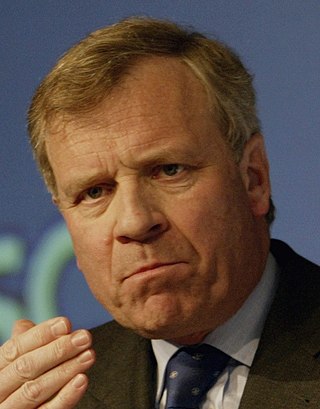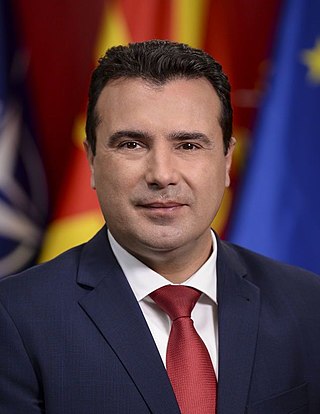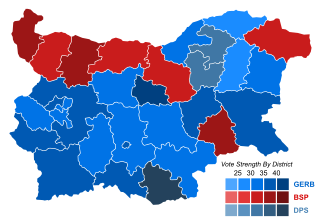| |||||
| Decades: | |||||
|---|---|---|---|---|---|
| See also: | |||||
Events in the year 1997 in Bulgaria .
| |||||
| Decades: | |||||
|---|---|---|---|---|---|
| See also: | |||||
Events in the year 1997 in Bulgaria .

The politics of Bulgaria take place in a framework of a parliamentary representative democratic republic, whereby the prime minister is the head of government, and of a multi-party system. Executive power is exercised by the government. Legislative power is vested in both the government and the National Assembly. The Judiciary is independent of the executive and the legislature.

Jakob Gijsbert "Jaap" de Hoop Scheffer is a Dutch retired politician, jurist and diplomat who served as the eleventh Secretary General of NATO from January 2004 to August 2009. A member of the Christian Democratic Appeal (CDA), which he led from March 1997 to October 2001, he served as Minister of Foreign Affairs from July 2002 until December 2003 under Prime Minister Jan Peter Balkenende.

Georgi Sedefchov Parvanov is a Bulgarian historian and politician who was President of Bulgaria from 2002 to 2012. He was elected after defeating incumbent Petar Stoyanov in the second round of the November 2001 presidential election. He took office on 22 January 2002. He was reelected in a landslide victory in 2006, becoming the first Bulgarian president to serve two terms. Parvanov supported Bulgaria's entry into NATO and the European Union.

The Bulgarian Socialist Party, also known as The Centenarian, is a centre-left, social democratic political party in Bulgaria. The BSP is a member of the Socialist International, Party of European Socialists, and Progressive Alliance. Although founded in 1990 in its modern form, it traces its political heritage back to the founding of the BRDSP in 1891. It is also Bulgaria's largest party by membership numbers.

Petar Stefanov Stoyanov is a Bulgarian politician who served as President of Bulgaria from 1997 to 2002. A member of the Union of Democratic Forces (UDF), he was the party's nominee to succeed one-term president Zhelyu Zhelev in 1996. He was elected to the Presidency in 1996, but lost his reelection bid in 2001. Following a brief retirement from politics, he became an MP in 2005 and later Chairman of UDF from 1 October 2005 to 22 May 2007. He resigned following the 2007 European Parliament election.

The Movement for Rights and Freedoms is a centrist political party in Bulgaria with a support base among ethnic minority communities.
Zhan Vasilev Videnov, sometimes spelled in English as Jean Videnov, was Prime Minister of Bulgaria from 25 January 1995 until 13 February 1997, a term remembered for the most severe economic and financial crisis in recent Bulgarian history, which featured hyperinflation and a drastic fall in living standards. He was chairman of the Bulgarian Socialist Party (BSP) from 1991 to 1996. Currently he is a college lecturer and inspirer of Che Guevara of Plovdiv.

GERB, is a conservative, populist political party which was the ruling party of Bulgaria between 2009-2013 and 2016-2021.
Bulgarian Democratic Center, formerly is a Bulgarian political party registered in 2007.

The Bulgarian Left is a democratic socialist political party in Bulgaria. It was created in February 2009 predominantly by members of the Bulgarian Socialist Party (BSP), with its constituent congress taking place on 4 April 2009. Its leaders are Hristofor Dochev, Ivan Genov, and Margarita Mileva.

Parliamentary elections were held in Bulgaria on 12 May 2013, two months ahead of schedule. Protests had forced the resignation of the GERB government in February, leading to the election being moved up.

Zoran Zaev is a Macedonian economist and politician who served as prime minister of North Macedonia from May 2017 to January 2020, and again from August 2020 to January 2022.

Parliamentary elections were held in Bulgaria on 26 March 2017. They had originally been scheduled for 2018 at the end of the four-year term of the National Assembly. However, following the resignation of Prime Minister Boyko Borisov and the failure of Bulgarian parties to form a government, early elections were called. Borisov resigned following the defeat of Tsetska Tsacheva, the candidate of his GERB party, in the November 2016 presidential elections. The official election campaign began on 24 February.
Events in the year 1990 in Bulgaria.

This national electoral calendar for 2021 lists the national/federal elections held in 2021 in all sovereign states and their dependent territories. By-elections are excluded, though national referendums are included.

Early parliamentary elections were held in Bulgaria on 2 October 2022 to elect members of the 48th National Assembly. The snap election was called after the fall of the Petkov Government, a four-party coalition, in June 2022. This was the fourth parliamentary election since 2021, an unprecedented situation in Bulgarian history, the previous elections being the April, July, and November 2021 elections.

Parliamentary elections were held in Bulgaria on 2 April 2023 to elect members of the National Assembly. These were initially scheduled to be held before November 2026; however, as no government was approved by the 48th Parliament, Bulgarian President Rumen Radev announced in January 2023 that he would call a snap election.